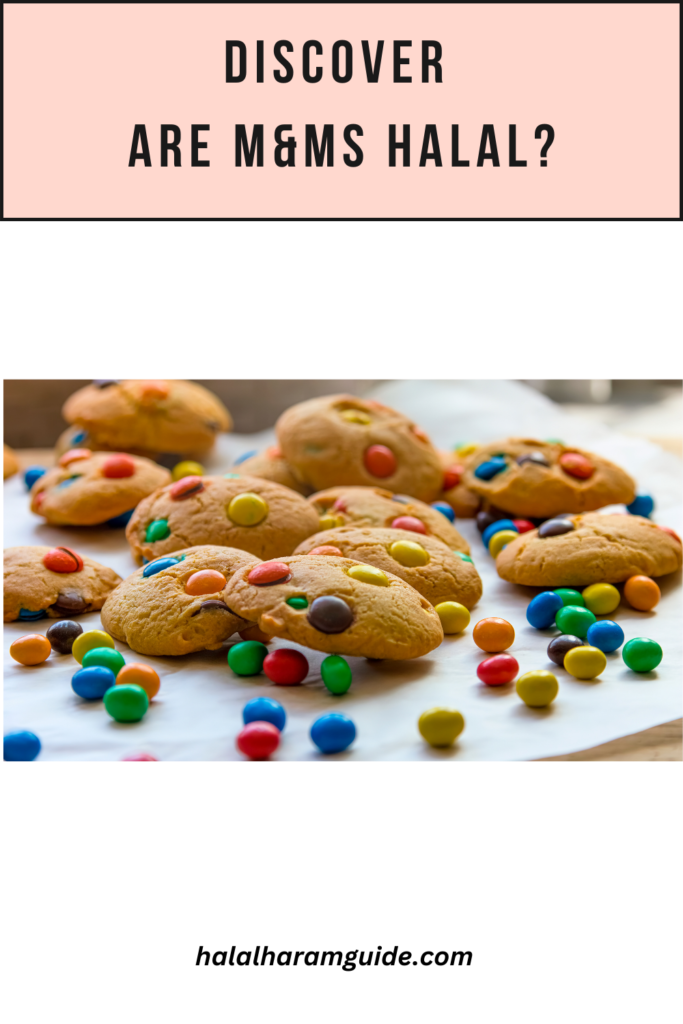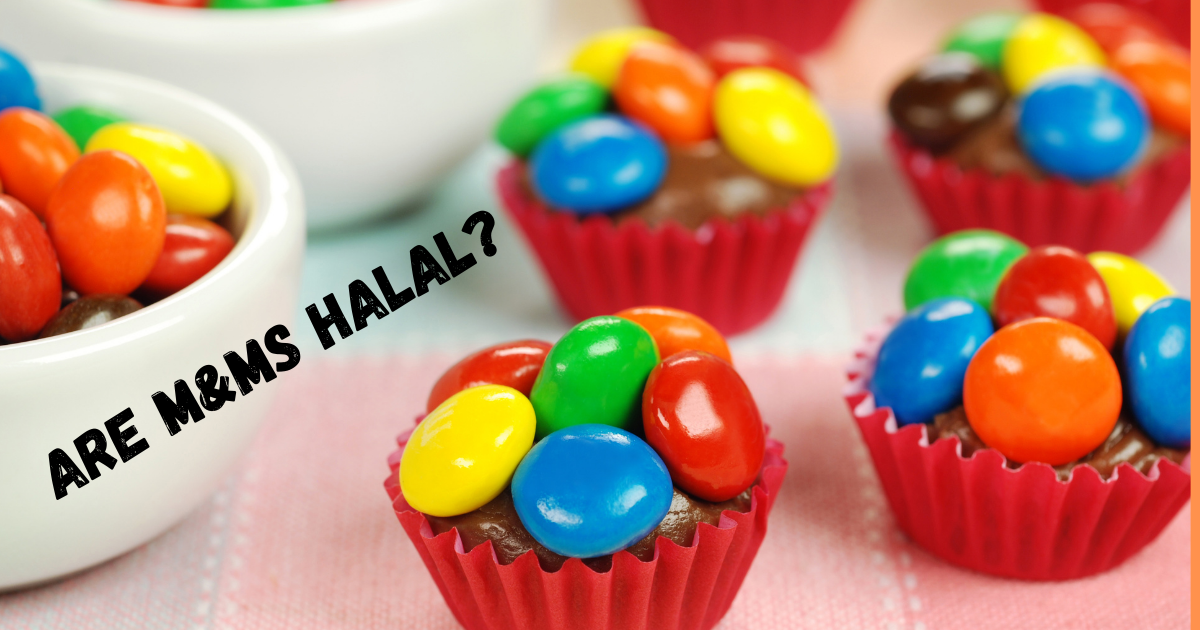Introduction
Welcome to our blog post exploring the question: Are m&ms Halal? For many individuals following Islamic dietary guidelines, the halal status of various food items is a crucial consideration.
In this article, we delve into the world of M&M’s to determine whether these popular treats are permissible for Muslim consumption.
Join us as we examine their ingredients, investigate their Halal credentials, and shed light on the options available for those seeking Halal-friendly candies. Let’s embark on this journey to find out if M&M’s make the cut as a permissible delight in a Halal diet.
What are m&ms?
M&M’s are colorful and iconic bite-sized candies produced by Mars, Incorporated. These candies have a distinctive button-like shape, featuring a hard candy shell that encases a chocolate filling. They come in various colors and flavors, with the original M&M’s consisting of a milk chocolate center.
Over the years, the brand has introduced a wide range of flavors, such as peanut, peanut butter, almond, crispy, and more. M&M’s have become a popular treat enjoyed by people of all ages around the world and are commonly found in supermarkets, convenience stores, and candy shops. The candy’s name is derived from the surnames of the company founders, Forrest Mars Sr. and Bruce Murrie, who created the product in the 1940s.
Are M&Ms Halal?
M&M’s were considered halal by many Islamic scholars and organizations. The ingredients in M&M’s did not contain any haram (forbidden) components like pork, alcohol, or certain types of animal-derived ingredients, making them suitable for consumption by Muslims.
Ingredients In M&MS
The ingredients in the classic milk chocolate M&M’s typically include:
- Milk Chocolate (sugar, chocolate, cocoa butter, skim milk, milkfat, lactose, soy lecithin, salt, artificial flavors)
- Sugar
- Cornstarch
- Less than 1% – Corn syrup, dextrin, coloring (includes Blue 1 Lake, Yellow 6, Red 40, Yellow 5, Blue 1, Red 40 Lake, Blue 2 Lake, Yellow 6 Lake, Yellow 5 Lake, Blue 2), gum acacia.
Is M&M Peanut halal
M&M’s Peanut variety was considered halal by many Islamic scholars and organizations. The ingredients in M&M’s Peanut variety typically included peanuts, milk chocolate, sugar, cocoa butter, chocolate, skim milk, lactose, milkfat, soy lecithin, salt, artificial flavors, and coloring agents.
Similar to other M&M’s products, it’s important to check the product packaging for the most up-to-date ingredient list and any specific halal certifications.
Can Muslims Eat m&ms
Many Muslims consider M&M’s to be halal and permissible to consume. The ingredients in M&M’s, including the classic milk chocolate and peanut varieties, did not contain any haram (forbidden) components such as pork or alcohol, making them suitable for consumption within Islamic dietary guidelines.
The popularity of M&M’s among people of different backgrounds, including Muslims, has been widespread for many years, as the ingredients used in their production generally align with halal requirements. However, it is essential to note that individual interpretations of halal may vary, and some Muslims may choose to follow stricter dietary guidelines or seek specific halal certifications for added assurance.
To make informed decisions about food consumption, including M&M’s, Muslims are encouraged to read ingredient labels and check for any halal certification provided by reputable Islamic authorities or organizations. If there are any uncertainties or specific dietary concerns, it’s always best to consult with knowledgeable religious scholars or experts.
Why is there a controversy over m&ms being halal?
The controversy over M&M’s being halal mainly stems from two factors:
- Ingredient Sourcing and Certifications: While M&M’s ingredients have generally been considered halal by many Muslims, there have been instances where consumers have raised concerns about the sourcing of specific ingredients or the lack of official halal certifications. Some individuals and communities may follow strict interpretations of halal requirements, and they might demand clear and specific certifications to feel confident about the product’s halal status. Without such certifications, some people may choose to avoid consuming M&M’s to err on the side of caution.
- Changes in Formulations and Production: Product formulations and production processes can change over time due to various reasons, including market demands, ingredient availability, and manufacturing practices. In some cases, these changes might lead to doubts about the halal status of the product, especially if there is limited communication or transparency from the manufacturer regarding the modifications. Such changes can fuel controversies and debates among consumers, especially those who are concerned about adhering strictly to halal principles.
What Makes m&ms halal Questionable?
The halal status of M&M’s can be considered questionable for a few reasons:
- Halal Certification: While many Muslims consider the classic milk chocolate and peanut M&M’s to be halal, some individuals and communities may follow stricter dietary guidelines and prefer products with official halal certification. M&M’s may lack such specific certification, leading to doubts or uncertainty among certain consumers.
- Ingredient Sourcing: Some people might question the sourcing of specific ingredients used in M&M’s or be concerned about the production process. Without clear information or transparency from the manufacturer about ingredient suppliers and production methods, doubts about the halal status may arise.
- Variations and Limited Editions: Special editions or seasonal variations of M&M’s might have different ingredients, flavors, or coatings. Some of these variations might contain non-halal ingredients, which can make them questionable or not permissible for those seeking strictly halal products.
- Individual Interpretations: Halal guidelines can be interpreted differently by different individuals or Islamic scholars. Some may have more lenient views, while others may follow stricter interpretations. This diversity of opinions can contribute to the questioning of whether certain products, including M&M’s, align with an individual’s personal understanding of halal.
Is m&ms Made With Pork?
The classic milk chocolate and peanut M&M’s did not contain pork or any pork-derived ingredients in their formulations. The ingredients listed for these varieties typically included milk chocolate, sugar, cocoa butter, chocolate, skim milk, lactose, milkfat, soy lecithin, salt, artificial flavors, and coloring agents. None of these ingredients are derived from pork.
How Is m&m Made?
The process of making M&M’s involves several key steps:
Chocolate Production: The process begins with the production of the chocolate center. Cocoa beans are harvested, fermented, and roasted to develop their flavor. The roasted beans are then ground into a paste called chocolate liquor. This chocolate liquor is further processed to separate cocoa solids from cocoa butter.
Molding the Center: The chocolate center of M&M’s is created by molding. The chocolate is shaped into small, button-like pieces and allowed to cool and harden.
- Adding the Candy Shell: The candy shell is made from a mixture of sugar and corn syrup. The small chocolate centers are placed in a rotating drum, and the sugar mixture is sprayed onto them. The centers are continually tumbled, allowing the sugar coating to build up layer by layer until the desired thickness is achieved.
- Coloring and Polishing: After the candy shell has formed, it is coated with food-grade coloring agents to achieve the vibrant colors associated with M&M’s. The candies are then polished to give them their characteristic shine.
- Sorting and Packaging: Once the M&M’s are complete, they go through quality control to remove any defective candies. The final products are then sorted, weighed, and packaged for distribution and sale.
Conclusion
In conclusion, exploring the halal status of M&M’s has provided valuable insights into the considerations for Muslim consumers seeking permissible food choices. While many Muslims consider classic milk chocolate and peanut M&M’s to be halal, the lack of specific halal certifications or variations in formulations has led to some questioning their permissibility.
To make informed decisions, it is crucial for individuals to read ingredient labels, seek halal certifications from reputable Islamic authorities, and consult with knowledgeable religious scholars if needed.
As preferences and production practices may evolve, staying updated with the latest information from the manufacturer is essential. Ultimately, the quest for halal food choices reflects the commitment of individuals to align their dietary practices with their faith,and this journey continues to drive discussions and awareness about halal certification in the ever-changing landscape of the food industry.
FAQS
Faqs about m&ms
Is M&M halal for Muslims?
Yes, M&M candies are considered halal for Muslims to consume as they do not contain any haram (forbidden) ingredients. They are permissible as long as they meet the requirements of halal certification.
Are M&Ms halal in Saudi Arabia?
M&Ms were certified as halal by the relevant authorities in Saudi Arabia, making them permissible for Muslims to consume in the country.
Is M&M haram UK?
M&Ms were not considered haram (forbidden) in the UK. They were widely available for purchase and consumption without any specific restrictions for Muslims.
Does M&M’s have gelatin?
Some varieties of M&M’s may contain gelatin, which is derived from animal sources. Whether they are halal or not depends on the source of the gelatin.
Are M&Ms halal in Pakistan?
M&M’s were considered halal and widely available for purchase and consumption in Pakistan.
- “Is Lobster Halal? Understanding Its Permissibility”
- “Is Drawing Haram in Islam? Understanding the Perspective”
- “Is Fermented Kimchi Halal? Exploring Kimchi’s Halal Status”
- “Is Collagen Halal? Unveiling the Halal Status of Collagen”
- “Is Wine Vinegar Halal? Unveiling Its Permissibility”


